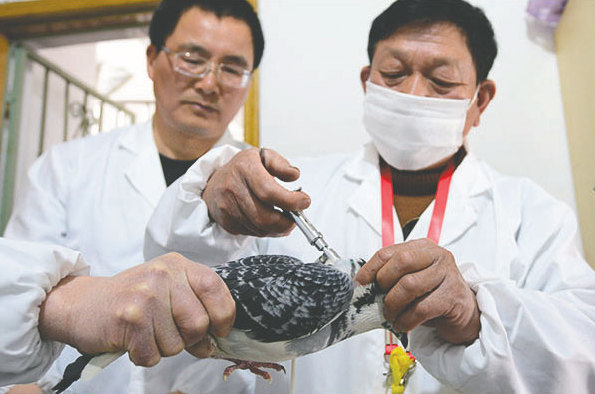China OKs US-made bird flu drug
Updated: 2013-04-10 10:58
By Kelly Chung Dawson in New York (China Daily)
|
||||||||
|
Workers from the Hangzhou Racing Pigeon Association vaccinate a bird of their member in Hangzhou, Zhejiang province, on Tuesday as China stepped up efforts to contain the spread of the H7N9 bird flu virus, which has infected 28 people and caused nine deaths in the country. Li Zhong / Xinhua |
When China's Food and Drug Administration last week announced approval of the experimental drug Peramivir for use in combating the recent H7N9 bird-flu outbreak in the country, the drug's US manufacturer found out like everyone else: from news reports.
North Carolina-based BioCryst Pharmaceuticals Inc hadn't applied for approval of Peramivir in China and is still trying to work out with Chinese officials a possible means to offer help and learn what the approval might mean for the company, said Bill Sheridan, senior vice-president and chief medical officer.
"We do not have access to information or the data on which the approval in China was based, but we are absolutely excited at the news," he told China Daily.
"Folks join this industry primarily because they want to make a difference in discovering drugs that might help people. If our drug can help the situation in China, that's terrific."
BioCryst is also open to supplying China with excess inventory remaining from the 2009 H1N1 influenza pandemic in the country, he said.
The Chinese agency, in a posting on its website dated April 6, said it had expedited approval of an intravenous form of Peramivir "to satisfy demand". The medication, it said, is "effective and provides an alternative to patients who cannot inhale or take drugs orally".
Like H1N1, the new H7N9 strain is a form of bird, or avian, flu, which typically spreads when humans come in contact with dead birds. H7N9 has so far infected 28 people and killed nine in China, according to officials.
Peramivir, which the US Food and Drug Administration temporarily approved for emergency use in the United States during the H1N1 outbreak three years ago, delivers high-plasma concentrations of an antiviral agent to sites of infection, according to company literature.
The drug appears to have been selected by the Chinese government for its injectable delivery method and its efficacy against viruses resistant to Tamiflu, a common anti-flu medication. The Chinese Ministry of Health initially said the new strain of the virus was receptive to Tamiflu, but that was before the weekend announcement on Peramivir.
Most treatments and antiviral flu drugs are administered orally, which can be difficult for severely ill patients on ventilators, or those suffering from diarrhea or vomiting.
"The intravenous formulation is extremely important," said Richard Webby, a member of the infectious-diseases department at St Jude's Children's Research Hospital in Memphis, Tennessee, and director of the World Health Organization's Collaborating Center for Studies on the Ecology of Influenza Viruses in Lower Animals and Birds.
During the 2009 pandemic, which according to the European Centre for Disease Prevention and Control killed 14,286 people worldwide, many doctors and hospitals found it difficult to administer anti-flu drugs orally, limiting their efficacy for severely ill patients, Webby said.
"If taken within a window of a few days from when the patient contracts the virus, Peramivir will certainly help alleviate the symptoms of the virus," he said.
"It's been proven to be an effective drug, and while we don't know much about how it works specifically with H7N9, I think that making this drug available in China is a really good idea."
When it was approved for emergency use in the US in 2009, the drug was distributed by the federal Centers for Disease Control and Prevention to hospitals across the country. BioCryst's Sheridan estimates that 1,300 people received the treatment back then, but results are difficult to track during an emergency, he said.
Although the US pharmaceutical company has a partnership with Japan's Shionogi & Co and Green Cross Corp of South Korea, it doesn't currently have any patents or partnerships in China.
In November, a Peramivir study was shut down by an independent data-monitoring committee, so the announcement in China was good news for BioCryst.
The company is in talks regarding its application for approval from the US FDA, which canceled the 2009 emergency authorization once the H1N1 bird-flu virus had been contained. On April 1 BioCryst said it had received guidance from the FDA "outlining a pathway" to potential domestic approval of Peramivir.
kdawson@chinadailyusa.com

 In Photos: 7.0-magnitude quake hits Sichuan
In Photos: 7.0-magnitude quake hits Sichuan
 Li Na on Time cover, makes influential 100 list
Li Na on Time cover, makes influential 100 list
 FBI releases photos of 2 Boston bombings suspects
FBI releases photos of 2 Boston bombings suspects
 World's wackiest hairstyles
World's wackiest hairstyles
 Sandstorms strike Northwest China
Sandstorms strike Northwest China
 Never-seen photos of Madonna on display
Never-seen photos of Madonna on display
 H7N9 outbreak linked to waterfowl migration
H7N9 outbreak linked to waterfowl migration
 Dozens feared dead in Texas plant blast
Dozens feared dead in Texas plant blast
Most Viewed
Editor's Picks

|

|

|

|

|

|
Today's Top News
Live report: 7.0-magnitude quake hits Sichuan, heavy casualties feared
Boston suspect cornered on boat
Cross-talk artist helps to spread the word
'Green' awareness levels drop in Beijing
Palace Museum spruces up
First couple on Time's list of most influential
H7N9 flu transmission studied
Trading channels 'need to broaden'
US Weekly

|

|








